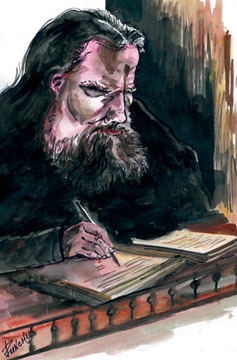|
Leo Tolstoy’s KREUTZER SONATA-:
The resonance of paranoia
by Dr Siri GALHENAGE
Last November, many events took place around the world to celebrate
the life and work of Leo Tolstoy, also known as Count Lev Nikolayevich
Tolstoy. Writing about this important event, the Moscow correspondent of
Daily Telegraph Andrew Osborn said that “Russia now is being accused of
abandoning its literary past in case of the outstanding Russian writer
Leo Tolstoy, because Russia ignores the 100-year anniversary of his
death.”
This is a clear indication how literary works of even literary giants
are treated and interpreted over the years. Could universal judgements
be passed on the work of writers such as Tolstoy and Pasternak is a key
question which merits our attention.
 However,
interpretations, and analysis of Tolstoy’s work, giving new insights
into the work of this literary genius will take place from different
cities of the world by different critics. However,
interpretations, and analysis of Tolstoy’s work, giving new insights
into the work of this literary genius will take place from different
cities of the world by different critics.
The following is an exclusive analysis of Leo Tolstoy's much
discussed novella--Kreutzer Sonata-- by Dr Siri Galhenage who has worked
in the UK and Australia as a Consultant Psychiatrist.
Pozdnychev’s heightened suspicion and jealousy
Tolstoy has established craftily that the marital relationship
between Pozdnychev and his wife is not functioning as it should be
between a normal husband and wife.
In this toxic arena enters a musician, by the name of Trukhachevski –
a semi-professional violinist who is described as ‘not bad looking’ with
superficial ‘gaiety’ and ‘maintaining his dignity in externals’,
Pozdnychev soon to undervalue him as a ‘worthless man’. But he appeals
to his wife as she was looking for a musician to accompany her on the
violin.
Trukhachevski’s talent for music; the nearness that came of playing
together; the impressionable nature of music, especially of the violin;
and his apparent lustful gaze towards his wife, tormented Pozdnychev and
creates suspicion and jealousy. He begins to suspect that the sound of
the piano was purposely made to drown the sound of their voices and
probably their kisses, as they practised.
The tension between the couple came to a head when she approached him
to express her displeasure regarding his behaviour towards her. He was
full of rage. ‘Having given reins to my rage, I revelled in it and
wished to do something still more unusual to show the extreme degree of
my anger. I felt a terrible desire to beat her, to kill her’.
‘I value not you [devil take you] but the honour of the family’, he
said to her. He confesses that he is jealous of Trukhachevski. ‘Could a
decent woman have any other feeling for such a man than the pleasure of
his music?’ she replies. Although he thought that she was covering up,
they made peace ‘under the influence of the feeling that was called
love’.
Despite all these, preparations continued for a musical performance
by the duet, followed by dinner to be held the following weekend at
their mansion.The musical evening proceeded without incident, except
that before the music began Pozdnychev followed the duet’s movements and
looks. They played Beethoven’s ‘Kreutzer Sonata’, which he revealed had
an ‘awful effect’ on him, making him ‘agitated’.
‘It was as if quite new feelings, new possibilities, of which I had
‘till then been unaware, had been revealed to me’. As he left that
evening, Trukhachevski said that he hoped to repeat the pleasure when he
next came to Moscow.
Pozdnychev goes away on official business and on the second day he
receives a letter from his wife. In addition to household matters she
mentions that Trukhachevski had called in to deliver some music ‘as
promised’.
He was unpleasantly struck by the news that the violinist had stayed
on in Moscow and had arranged to visit his wife in his absence. ‘The mad
beast of jealousy began to growl in its kennel and wanted to leap out,
but I was afraid of that beast and quickly fastened him’.
Pozdnychev was tormented by intrusive thoughts and counter- thoughts
regarding the suspected unfaithfulness of his wife. At this stage, it is
pure Imagination of what may have gone on between his wife and the
violinist in his absence but the very thought process inflames his
jealousy, and ‘burnt him with indignation’.
‘The vividness with which they presented themselves seemed to serve
as proof that what I imagined was real’. The humiliation he felt as a
result of Trukhachevski’s apparent victory over him fills him with a
strong feeling of hatred towards his wife.
He even suspected the paternity of his children: ‘perhaps she long
ago carried on with the footman, and so got the children who are
considered mine!’ He claimed to have complete ownership to her body, yet
felt that he had no control over it.
He predicted that some dreadful event is about to happen. A strange
sense of joy arises in him that his torture would be over, that now he
could punish her, and could get rid of her.
 Pozdnychev
decides to cut short his official business and returns home. The first
thing he noticed on entering the house, past mid- night, is a man’s
cloak hanging on a stand: ‘I ought to have been surprised but was not,
for I had expected it’. Pozdnychev
decides to cut short his official business and returns home. The first
thing he noticed on entering the house, past mid- night, is a man’s
cloak hanging on a stand: ‘I ought to have been surprised but was not,
for I had expected it’.
What he imagined has now become a reality. He picks up a dagger and
entered the room where his wife and the violinist were having a union
outside their marriage. The expression of terror in them gave him a
sense of perverse pleasure.
He also detected signs of annoyance in his wife’s face for what he
thought was the disruption to her ‘love’s raptures’. He stabs her on the
side below the ribs with all his might. As she lay dying, what was
important to him was her confession of unfaithfulness, which he did not
receive; he felt that it was beneath her to admit her guilt.
The assailant admitted that he was aware of his action with
extraordinary clearness. ‘I knew what I was doing when I did it’. ‘I was
doing an awful thing such as I had never done before, which would have
terrible consequences’. He said that jealousy was not the only reason
for his act of murder.
The court decided that he was a wronged husband who killed his wife
defending his outraged honour! He was acquitted!! So he lived to tell
his tale.
Pozdnychev’s background
Pozdnychev was born into the nineteenth century Russian upper class
of land owners. He was brought up in a social milieu where men
determined the ‘moral code’ and women submissively adapted to it, both
sexes engaging in debauchery, overtly when single and covertly during
marriage. In cases of alleged wrong-doing, the judicial system was
designed to protect men. It was a breeding ground for jealousy,
suspicion and acrimony.
Pozdnyshev was a landowner, a graduate of the university and a
marshal of the gentry.
He grew up in a society that expected men, in their formative years,
to engage in sexual activity without making any moral commitment to
women with whom men need not develop any attachments.
Such behaviour was considered legitimate, ‘good for health’,
‘something to be proud of’, often sanctioned by parents and even by the
State that regulated brothels to make them safe for boys.
Pozdnyshev indulged in debauchery since the age of 16 but suffered a
deep sense of remorse for having ‘lost his innocence’ thinking that he
has sullied his ability for intimacy with women. He could detect a
debauchee by the way the latter eyed a woman.
In defiance of such a sordid and hypocritical background, and through
his own experience, Pozdnychev seemed to have developed a certain value
system, albeit idiosyncratic, overvalued and even malignant.
He believed that a woman’s charm could be deceptive; love - a
pretence; sex - brutish; matrimonial sacrament - a mere ritual without
spiritual grace; marriage - acrimonious; pregnancy – a protection
against feminine coquetry; and child rearing – a torment.
He demanded his wife’s loyalty, her commitment and the exclusivity of
her intimacy, without directly raising issues of sexual fidelity.
It was the alleged transgression of his self imposed code of conduct
which led to his wife receiving her ultimate punishment.
But there was an even more virulent psychological aspect hidden
beneath the above socio-cultural and moral influences -- a paranoid
process presenting in the form of morbid jealousy.
Pozdnychev married a girl of ‘moral perfection’, and his expectation
was that she would maintain her morality despite living in ‘a mire of
coquetry’.
But with ongoing marital discord, her increased attention to her
appearance [free from pregnancy] and her revival in interest in the
piano, shoots of suspicion started to spring up in his mind.
The situation came to a head when a third party entered the intimacy
of their relationship – a violinist who formed a duet with his wife.
Pozdnychev felt threatened by his perceived rival. He compensated for
the threat to his self-esteem by either denigrating him or actively
encouraging their music [reaction formation].
He was tormented by thoughts of disloyalty, betrayal and of desertion
by his wife and became resentful of the imminent loss of his
‘possession’. He viewed with suspicion the proximity of the violinist to
the pianist and their apparent amorous gaze, and feared the ‘hypnotising
effect’ of music on each other. He thought that the music was purposely
made to dampen their chatter and their kisses.
The Kreutzer sonata they played together had a negative impact on his
body and mind. Recurrent and vivid imaginings of his wife’s
unfaithfulness, in his absence, inflamed his jealousy and led him to
believe that they were real.
Faithfulness and loyalty
Faithfulness and loyalty in action alone was never enough for the
jealous, it had to be in thought as well.
As such doubt became a constant companion that stirred up his
jealousy. Pozdnychev even began to doubt the paternity of his children
entertaining transient thoughts that his footman could be their father.
Alongside feelings of humiliation resulting from the perceived
preference of the rival by his wife was the insatiable need to expose
her unfaithfulness and to deliver punishment.
A central issue in morbid [paranoid] jealousy is a perverse sense of
ownership – ‘either I own her or destroy her’. Pozdnychev discovered
what he thought was proof of his wife’s unfaithfulness and he destroyed
her. No evidence of innocence or confession was going to satisfy him.
Conclusion
Undoubtedly, Kreutzer Sonata is one of the major literary works by
Tolstoy, which deals with the perennial issues of morality, love and
sexual abstinence.
It is important to recognise that the story is narrated through the
perspective of the main protagonist, Pozdnyshev.
According to some critics, the novella presents Tolstoy's
controversial view on sexuality, which affirms that physical craving is
an impediment to relations between men and women and may result in
calamity.
According to the respected German psychiatrist, Ernst Kretschmer
[1927], paranoia derives from cumulative influences of a noxious social
environment, a characteristic personality with marked ‘sensitivity’ and
a personal experience ‘meaningful’ to the individual.
In capturing all the above features of this morbid human condition in
Kreutzer Sonata, Leo Tolstoy, acknowledged by many as the greatest
writer of the 19th century, appears to me to be one step ahead of the
psychiatric profession!
For reader’s feedback: [email protected]
|

